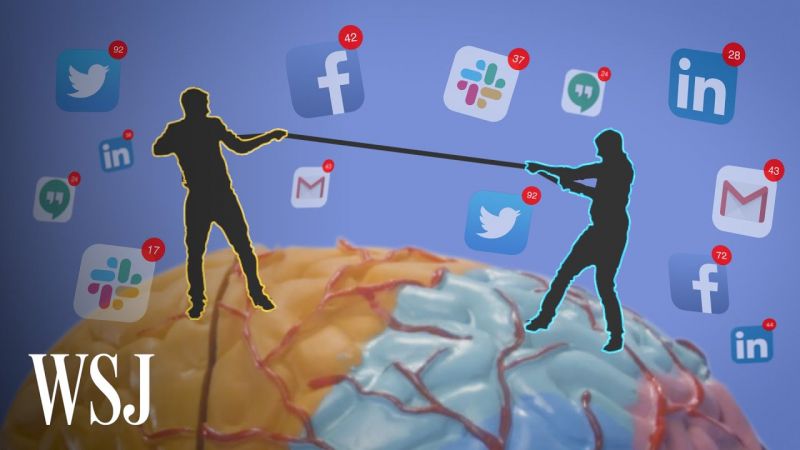Technology and Its Effects on Mental Health in the Workplace
What is all of that screen time doing to our brains?
Escrito por Rachel Unger

01 Technology is rapidly transforming how, when and where we work.
02 There are ways to leverage technology that promote mental health and facilitate productivity in the workplace.
03 When used excessively, technology can be a source of stress that’s both draining and distracting, so it’s important to set boundaries around screen time.
Imagine a world without email. It’s hard. No digital updates or checking threads at all hours. These days, we take our work with us everywhere we go.
Technology has significantly changed the way we work, blurring boundaries between our professional and personal lives. As platforms have evolved, our relationship with them has changed as well. We rely on technology now more than ever to communicate and accomplish daily tasks.
There's no denying the benefits of modern technology. We can access high-quality data, store masses of information and automate time-consuming tasks, ensuring we’re on top of our work. Advances are enabling high-quality video conferencing with people from all around the world and allow us to send files in an instant so that we can work flexibly.
These advances can boost productivity and increase performance, but there are considerations for the way we use tech, particularly as it relates to our mental health.
The Effects of Screen Time
We know that sitting hunched over a desk with our eyes glued to our screens isn't great for our physical health, but what does all of that screen time do to us mentally?
Screen time increases our exposure to blue light, which can degrade sleep quality by throwing off our internal clock and suppressing melatonin, a hormone that regulates our sleep cycle. The light from our devices tricks our brains into thinking they need to be constantly awake. When we don't get quality sleep, our energy and mood levels suffer, and that can make it hard to maintain our mental health.
We are in an age of distraction and digital overload. With the barrage of constant interruptions from our smartphones and computers, it can be hard to feel like we’re 100% effective at any given task. Whether it’s the knocking sound of a Slack message or the flash of an incoming text, notifications are detracting from our ability to focus.
One study found that even when smartphones are turned off, having them within reach can significantly reduce cognitive performance. And a poll by Pew Research Center showed that one-in-five (22%) workers believe that using social media hurts their job performance.

How Smartphones Sabotage Your Brain's Ability to Focus | WSJ
Our phones give us instant gratification. But there’s a cost: loss of attention and productivity.
Information Overload
Technology gives us immediate access to information and allows for rapid communication, enabling us to flip from one task to the next. But when we switch between apps and programs, our attention gets split among our various to-dos. Research has shown that our brains simply aren’t wired for multitasking.
Instead of accomplishing one thing and executing it well, we end up doing multiple things, with mediocre results. We’re not as productive when we work this way, and our work quality decreases. Media multitasking has also been identified as a potential risk factor for mood and anxiety issues.
The Psychological Impact
Many of us rely on smartphones for work-related tasks, but doing so has drawbacks. The way we use our phones has been linked to rising levels of the stress-related hormone cortisol. Over time, that kind of chronic stress can lead to depression and other serious conditions.
When we’re using technology in this way, it can be hard to switch off. Many of us are answering emails and phone calls outside of working hours and feel pressured to be constantly available. This always-on culture increases our stress levels and throws our work/life balance off-kilter. Organizational expectations about responsiveness are huge drivers of tech-related stress.
As we continue to depend on technology, it’s important that workplace leaders implement strategies that help employees strike a healthy balance. They could consider:
- Disabling pop-up notifications on smartphones and computers and using do not disturb mode during work hours
- Instituting tech-free meetings and email-free working hours
- Promoting a policy for leaving laptops and work phones in the office
- Scheduling activities for employees during lunch so they can disconnect entirely
- Designating a phone-free space where employees can unwind
- Giving employees the option to block out “heads down” time on their calendar when they won’t be responding to messages or emails
Taking a digital detox can also benefit our mental health. One study found that limiting social media use to approximately 30 minutes per day significantly reduced symptoms of loneliness and depression. Another study reported that after one week without using Facebook, respondents reported a higher level of life satisfaction than those who didn’t limit their use.
Employers also have an opportunity to use tech to support wellness, whether that’s through online mental health training, text-based therapy, wearable technologies or mental health apps.
By changing the culture around our use of technology, we can enhance workplace wellbeing and productivity without sacrificing the benefits that technology has for businesses.
Sobre el autor
Rachel Unger is a writer and editor based in Washington, D.C. She's passionate about raising mental health awareness and promoting fairness in the workplace.
Apoya nuestro trabajo
Nuestra misión es cambiar la manera en que el mundo percibe la salud mental.



















